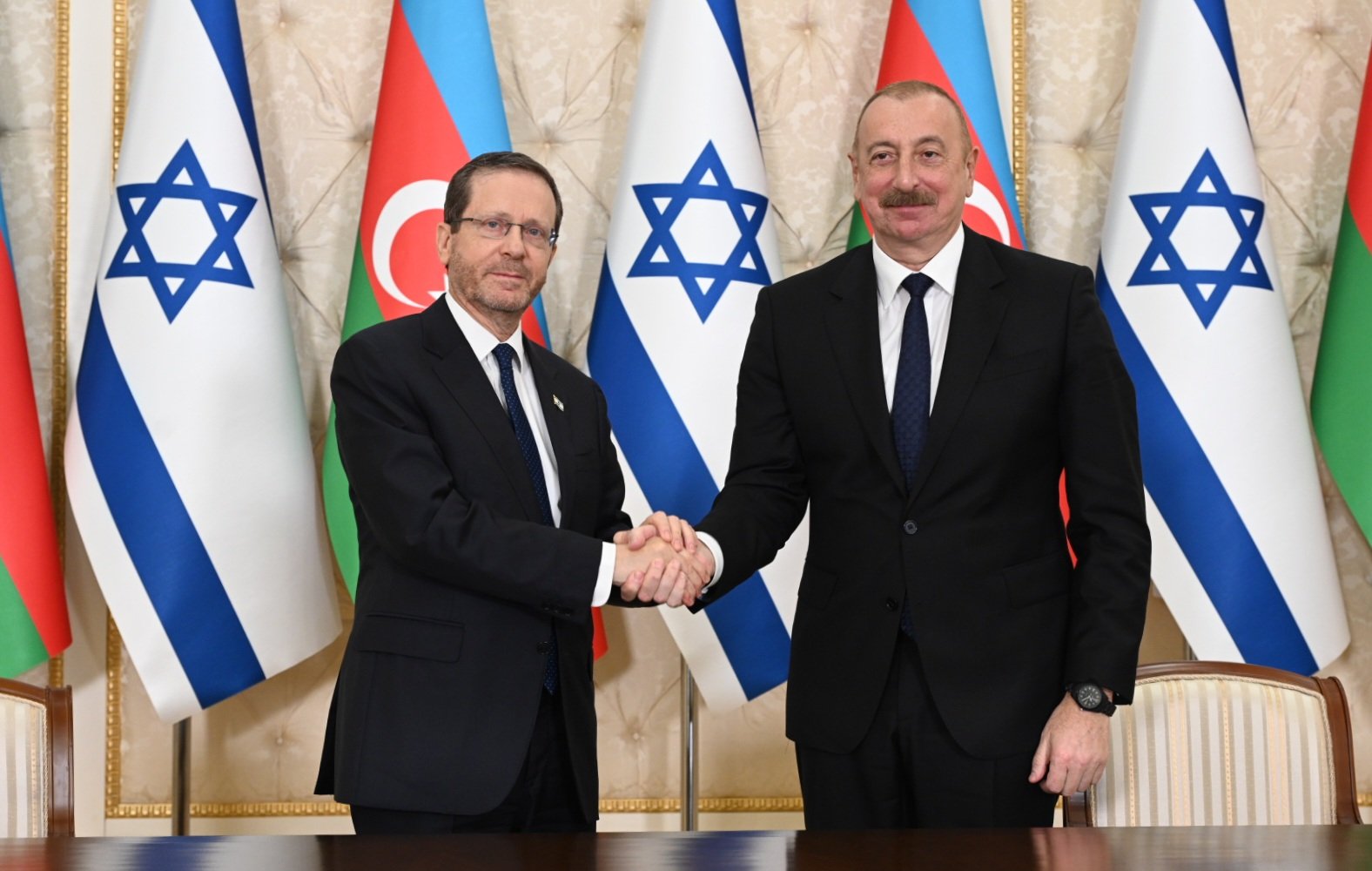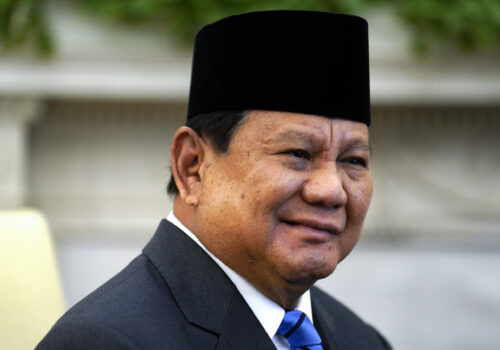Joseph Epstein
Iran is widely recognized as a destabilizing force that funds and supports terrorist organizations both in the Middle East and far beyond its borders. In recent years, its militant proxies have wreaked havoc in Yemen, Lebanon, Syria, the Palestinian Territories and Iraq. Yet, by partnering with Israel, one small nation on Iran’s frontier—Azerbaijan—has managed not only to survive but to prosper.
US President Donald Trump should recognize that Azerbaijan has not only maintained thirty years of good relations with Israel but has also proven itself as a reliable security and economic partner of the Jewish State. If the United States were to build on Israel’s close relations with Azerbaijan to deepen its own ties to Baku, Washington could gain significant economic, diplomatic, and security benefits, including an enhanced partnership with a bulwark against Iranian influence.
A troublesome neighbor
Since gaining independence in 1991, the small Caspian Sea nation of Azerbaijan has struggled with Iran, which has threatened it with war, sponsored a terrorist group on its territory, and, according to Azerbaijani officials, supported hardline Islamist groups that tried to overthrow its government.
Azerbaijan, which neighbors Iran and has a population nine times smaller than the Islamic Republic’s, has largely maintained its autonomy and stability by relying on Israel and Turkey to keep Tehran at bay.
Iranian and Azerbaijani relations have long followed a repeating pattern of crises and détentes. Currently, their relations are in a détente phase. But as recently as August, Iranian President Masoud Pezeshkian proposed targeting Azerbaijan instead of directly striking Israel in retaliation for the assassination of Hamas political leader Ismail Haniyeh in Tehran.
SIGN UP FOR THIS WEEK IN THE MIDEAST NEWSLETTER
In 2022 and 2023, Iran threatened war against Azerbaijan multiple times, moving forces onto the border and holding massive military exercises, including a simulated invasion across the Aras River into Azerbaijan. Recently, Iran’s primary concern with Azerbaijan centered around the establishment of the Zangezur corridor, a proposed route between Armenia’s Syunik Province and Azerbaijan’s Nakhichevan enclave. Such a corridor would put all of Iran’s northwest border under Turkish and Azerbaijani control, a scenario Iranian Foreign Minister Abbas Araghchi has called a “red line.”
Much like with Israel, the Islamic Republic has irreconcilable differences with Azerbaijan.
Today, although Iran does not allow ethnic censuses, an estimated thirty million ethnic Azerbaijanis live in northwest Iran—three times the population of Azerbaijan and a third of the Iranian population. Like other minorities in Iran, Azerbaijanis face political oppression as well as cultural, linguistic, economic, and even ecological discrimination.
Many of Iran’s policies toward its minorities stem from paranoia over ethnic separatism. As the national homeland of its largest minority, Iran sees Azerbaijan as posing a particular threat. As such, Tehran worries that Baku may inspire Azerbaijanis to revolt.
But Azerbaijanis in Iran don’t need inspiration from Baku to voice their dissent against their government’s foreign policy. During the 2020 Second Nagorno-Karabakh War between Azerbaijan and Armenia, Iranian Azerbaijanis rushed to the borders to cheer on the Azerbaijani military. Some even openly protested the Islamic Republic’s support for Armenia in the conflict.
Iran has used two main tools against Azerbaijan—support for Armenia and proxy warfare.
Traditionally, Iran used relations with Armenia as a tool against Azerbaijan. Over thirty years of conflict with its western neighbor took up most of Azerbaijan’s foreign policy bandwidth. Iran supported Armenia since the beginning of the First Nagorno-Karabakh War in 1992, albeit discreetly, to keep Azerbaijan in check. Since the 2020 war, that support has come out in the open with large weapons deals, intelligence cooperation, high-profile meetings with the Ayatollah Ali Khamenei, and vows from Iranian leaders to defend Armenia.
As both then Iranian Foreign Minister Hossein Amir-Abdollahyan and Iranian Ambassador to Armenia Mehdi Sobhani declared in 2022, “Armenia’s security is Iran’s security.”
Iran has also waged a steady irregular warfare campaign against Baku using an ethnic Azerbaijani proxy known as the Husseiniyyun, or followers of the third Shia Imam Hussein. The late Islamic Revolutionary Guard Corps Quds Force Commander Qasem Soleimani created the group in 2015. Since then, the Azerbaijani government has accused the Husseiniyyun of having been behind multiple assassination attempts against Azerbaijani officials, including the mayor of Ganja, Elmar Valiyev, and outspoken anti-Iranian parliamentarian Fazil Mustafa. The group also actively propagates extremist Khomeinist ideology, pushing for an Islamic revolution and attempting to incite public demonstrations and attacks on Azerbaijani, Jewish, and Israeli targets. According to Azerbaijani security officials, Baku has thwarted multiple terrorist attacks by the group, including an attempt on the Israeli embassy in 2023. Additionally, it has busted up affiliated Iranian spy rings allegedly tasked with overthrowing the government.
Azerbaijani-Israeli ties
In the face of this threat, Azerbaijan has turned to support from Israel.
Israel was one of the first nations to formally recognize Azerbaijan after the latter declared its independence in 1991. Their real bilateral cooperation started in October 1995, after a meeting between then Israeli Prime Minister Yitzhak Rabin and then Azerbaijani President Heydar Aliyev. As the Israeli outlet Maariv reported, during their conversation, Aliyev spoke of Azerbaijan’s “long and troublesome border with Iran” and asked for security assistance, which Rabin promised to consider.
Since then, Baku and Jerusalem have become close partners, especially in the critical spheres of military and energy cooperation. Azerbaijan is the top energy exporter to Israel, supplying it with 55 percent of its oil imports. For its part, Jerusalem sells Baku billions of dollars’ worth of weapons and military technology. Israeli weapons made up 69 percent of Azerbaijan’s weapon imports from 2016 to 2021. These shipments included missile interceptor systems and Harop drones, which played a major role in Azerbaijan’s victory over Armenia, which received backing from Iran, in the Second Nagorno-Karabakh War. Although Turkey was Azerbaijan’s largest backer during the conflict, Israeli weapons greatly enabled Azerbaijan’s successful offensive. Unfortunately, the military assistance from Turkey and Israel have permitted Baku to pursue a truculent policy which has made it more difficult to achieve peace between Armenia and Azerbaijan.
Historically good relations with Jews in Azerbaijan and internationally also helped usher in close ties. Jews have lived in Azerbaijan since at least the seventh century and, like in many other Turkic countries, faced little to no antisemitism. According to Azerbaijani-Jewish diaspora organizations, no country has been “as friendly and loyal” to their Jews as Azerbaijan. This has led to stellar ties with Jewish diaspora organizations, which have helped improve Azerbaijani-US relations. As then Azerbaijani Foreign Minister Hassan Hassanov said, “we don’t conceal that we rely on the Israel lobby in the US.” Indeed, relations with the Jewish State have helped improve Azerbaijan’s ties with Washington. In 2002, Jewish organizations helped waive a ban on aid to Baku. In December 2024, the largest US pro-Israel lobbying group, AIPAC, sent its outgoing president and president-elect to meet with Azerbaijani President Ilham Aliyev, telling him, “your support for Israel will be recognized.”
But the most significant benefit from Baku’s relations with Israel has been deterring Iran. As early as the 1990s, Israel helped Azerbaijan set up electronic intelligence-gathering stations. According to Forbes, the Mossad enjoys a “large and significant presence” in the country. When Iran threatened an Azerbaijani oil tanker in the Caspian Sea in 2001, both Turkey and Israel vowed defense support. In 2011, Jerusalem began supplying Baku with Orbiter 2M surveillance drones to monitor the Iranian border. From 2016 to 2023, Haaretz reported ninety-two flights carrying weapons exports from a military base in Israel to Azerbaijan. These flights increased right before Azerbaijan’s September 2023 military offensive against Nagorno-Karabakh and continued between November 2023 and April 2024, when its relations with Iran were at a nadir. The ongoing war in Gaza has not derailed this collaboration.
Additionally, Haaretz reported that Azerbaijan provided the Mossad with a forward base to monitor Iran and even prepared an airfield for Israel to use if it planned to target Iranian nuclear weapon sites. Although Azerbaijan denied the latter assertion, Obama administration officials assessed in 2012 that Israel could use Azerbaijan as a staging ground to strike Iran. Such access would remove the need for Israeli fighter jets to refuel midflight.
Considering the sensitivity of such cooperation, it is likely that leaks of this kind are part of a much greater picture. As a WikiLeaks memo later showed, Aliyev himself said that relations with Israel are “like an iceberg” with “nine-tenths below the surface.” In the same memo, Aliyev said that, like Israel, Azerbaijan views Iran as an “existential threat.”
Such ties with Israel act as a strong deterrent and have instilled confidence in Azerbaijan. In response to Iranian threats over relations with the Jewish State in 2021, Aliyev posted a photo of himself caressing a Harop drone near the Iranian border.
Recently, Azerbaijan has taken advantage of Iranian weakness to begin a renewed push to establish the Zangezur Corridor. On January 7, Aliyev said the corridor “must and will be opened.” Much like the fall of Syrian dictator Bashar al-Assad, this wouldn’t have been possible without Israel decimating Iran’s power projection over the past year and a half.
How Israel benefits—and the US could, too
To be sure, Israel also gains from its ties with Azerbaijan.
Besides key energy imports and a bulwark against Iran, Israel has gained a partner that can help expand its influence and trade to Central Asia and help mediate its relations with Turkey. Turkish-Israeli relations have suffered since the October 7, 2023, massacre by Hamas and the ensuing war in Gaza. As a result, Azerbaijan’s role as an arbitrator is increasingly vital, especially since Turkey and Israel share some regional goals, such as keeping Iran out of Syria. Hikmet Hajiyev, a top advisor to Aliyev, appears to have taken on this role. Following the fall of Assad, Hajiyev flew to Jerusalem and Ankara to relay messages between the two countries.
Azerbaijan has long acted as a mediator. Baku officials sought reconciliation following the crisis in Israeli-Turkish relations following the Marmara incident in 2010, in which Israeli commandos killed nine Turkish activists trying to breach a naval blockade in Gaza. Aliyev began mediating between the two countries himself in 2018, including in personal conversations with Turkish President Recep Tayyip Erdoğan. According to the Institute for National Security Studies, an Israeli research institution, Azerbaijan played an important role in negotiations over normalization between Turkey and Israel between 2021 and 2023.
Baku has also served as an interlocutor with the Arab world. According to Chen Baram of Hebrew University, Azerbaijan acted behind the scenes to bring Israel closer to the Persian Gulf countries. Baram said he “personally witnessed meetings between Israelis and high-ranking officials from the Arab world in Baku, years before they became official in Israel.”
So far, it has paid off. While Iranian influence has had devastating effects on Lebanon, Iraq, and Yemen, Azerbaijan is safe from its grip. And as Tehran surrounds Israel with its proxies, Jerusalem has a key ally on Iran’s border.
Washington should learn from Israel’s diplomatic and security collaboration with Azerbaijan to bolster its own ties with Baku. Besides being a bulwark against Iran, close relations with Azerbaijan could help the United States gain a stronger foothold among Central Asian countries, with whom Azerbaijan has been developing stronger relations. This would be especially important for the United States, as Central Asia is rich in minerals and energy and is home to the Middle Corridor, a trade route from Asia to Europe that bypasses both Russia and Iran. After the Second Nagorno-Karabakh War, Azerbaijan has prioritized deepening its ties with the Turkic world.
Washington could start by expanding the Abraham Accords to Azerbaijan, as well as Central Asian countries. Doing so would include both the Caucasus and Central Asia in a high-profile forum with access to top-level diplomats. To date, no US president has visited Central Asia, while Russian President Vladimir Putin and Chinese leader Xi Jinping have made regular stops there. Hosting an Abraham Accords conference in Baku would be fitting, considering all the secret meetings between Israel and Gulf governments that have allegedly already occurred there over the years.
Should the United States take the same approach as Israel and deepen its diplomatic, economic, and security ties with Azerbaijan, it may reap similar geopolitical rewards.
Joseph Epstein is the director of research at the Endowment for Middle East Truth, a senior fellow at the Yorktown Institute and a research fellow at the Post-Soviet Conflicts Research Program at Bar Ilan University’s Begin Sadat Center for Strategic Studies. He also sits on the advisory board of the Alekain Foundation, a nonprofit dedicated to providing education to women and girls in Taliban-controlled Afghanistan.
Further reading
Fri, Dec 13, 2024
To advance Saudi-Israeli relations, let the private sector lead
MENASource By Mark Donig and Tally Zingher
With the right policies in place, the US private sector can play a critical role in advancing US-Saudi-Israeli economic relations, creating a reality that will make normalization more achievable in the coming years.
Thu, Dec 12, 2024
The benefits of Indonesia in the Abraham Accords
MENASource By Daniel J. Samet
Given Israel’s current predicaments, it’s easy to overlook its opportunities. Not least, normalization with Indonesia will redound to the advantage of all parties involved.


